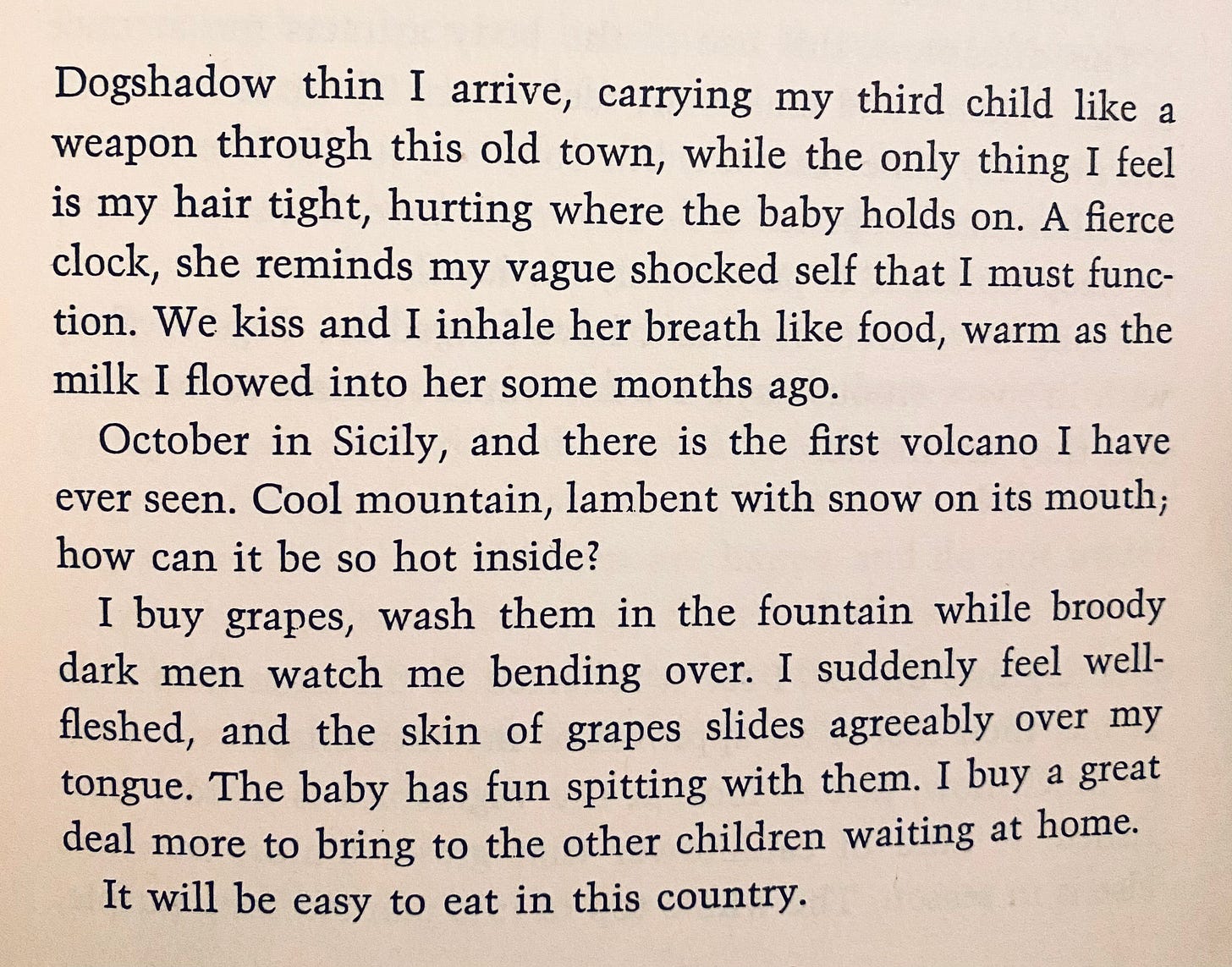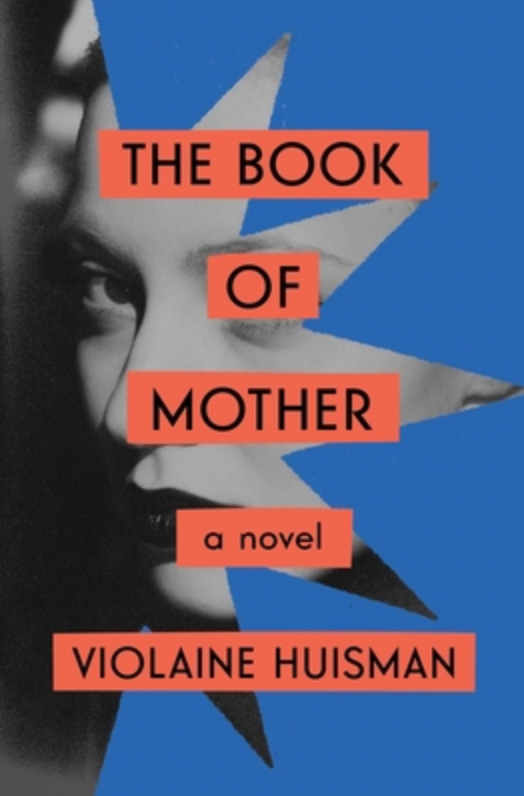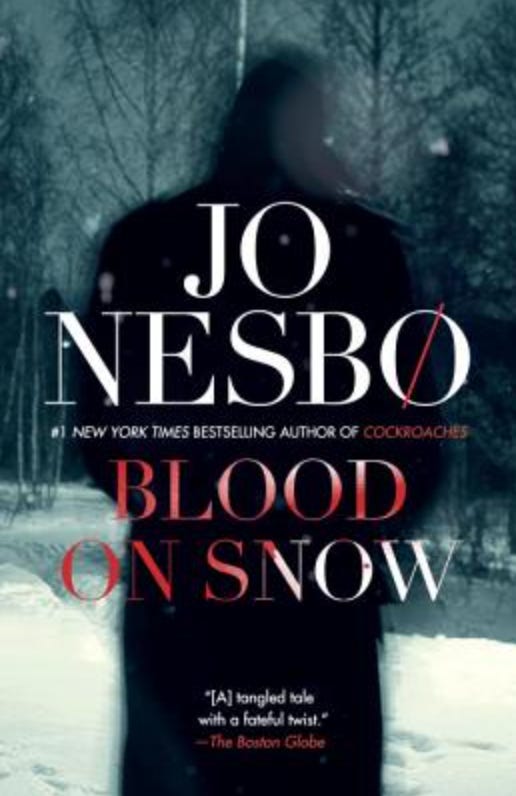I'm finding it hard to live in this world, but it was a good month in books. In January, I read obsessively and enjoyed everything I read. In addition to actual books, I read about forthcoming books and made lists and filled online carts and pitched a few to review. I went on one bookstore date and overspent at Moe's in Berkeley. (I bought the new Samantha Hunt, Lucky Breaks by Yevgenia Belorusets, though the text is so tiny I fear I won’t be able to read it, one volume of a Kafka biography, and a couple others. My sweetheart got his own copy of Lote and managed to find still more books about Hegel, though I’d have bet he already owned them all.)
Not unrelatedly, I also wrote a lot, and allowed myself to feel excitement about a project that’s gaining momentum.
I’ll begin this month with a new obsession:
This edition of Sicily Enough by Claire Rabe is from 1976, though it was written in the early 60s. It was given to me by my bibliophile aunt and I’ve been meaning to read it for a couple years. This month I finally opened it and — just take in this excellent, strikingly contemporary opening page:
Dogshadow thin I arrive! Sicily Enough was serialized in 1963 in Olympia Magazine, the short-lived publication of Olympia Press (the Parisian one that published Lolita, as well as envelope-pushing work by Beckett, Henry Miller, Jean Genet, Pauline Réage, and others). This slim book tells the fragmented story of a mother of three traveling alone with her children and discovering herself through an affair with a Sicilian man. The air is heavy, the sex is intense, the food is delicious (to beat the heat, “speckled melon with a ruby center”). There is no plot as such. A woman guiltily abandons herself to lust and is tugged back to reality again and again by motherhood, which of course is often its own transporting passion.
The rest of Sicily Enough doesn't continue to be quite as exciting as that first page — the prose is purple (indeed, throbbing) and a bit embarrassing in places — but generally speaking, this is found treasure. It belongs on a shelf with my favorite Elena Ferrante novel, Days of Abandonment, another sultry, slightly desperate summer book about a sweaty-thighed woman in bondage to her children and her own desires. Both books could be filed under Men: can’t live with ‘em, can’t live without ‘em (though it should be said that both narrators experience a kind of clarity without ‘em).
Sicily Enough appears to be out of print, although you can still find a copy online. My first thought when I read the first page was: is it finally time for me to start an imprint so I can publish things like this? Probably not, but I did go deep trying to research the rights to this book and the unsung Rabe, who owned a club called Baudelaire’s in Santa Barbara. She wore all black and sunglasses for an appearance on a public access show called “Outrageous Women” in the 80s, where she read from this book to the sound of live accordion accompaniment, so: she's my people. I will continue to find out what I can about her.
Other books I enjoyed this month:
The Book of Mother by Violaine Huisman is a work of autofiction about mental illness tearing through a well-heeled French family. It’s an impressively lyrical and clear-eyed record of a childhood spent in thrall to and devastated by an unpredictable, vivacious, loving/cruel mother. It’s a wonder people survive such childhoods, let alone find the wherewithal to write it all down. About a third of the way into the novel, when I googled the author and watched a portion of a YouTube interview with her, I realized that we worked together 20 years ago and I felt a surge of tenderness and admiration. This is a beautiful book.
I traveled to Japan for the first time in December and, thanks to my hosts, got to see many places on the short trip, from Yokohama and Tokyo to Matsumoto and a small hot springs town. The experience was thrilling and I came away with a version of the impression I expected: the country is incredibly beautiful and well-ordered and people feel a collective responsibility to maintain beauty and order.
Of course that’s wildly simplistic. I wanted to see another side of Tokyo and maybe I could’ve looked harder for it, but I had to read instead. That Tokyo is here, in Tokyo Ueno Station by Yu Miri, a melancholy (okay, depressing) novel about a homeless ghost haunting a park beside a train station in the crowded city center and thinking back on his life. He moved to Tokyo as a migrant laborer ahead of the 1964 Olympics, and lived through (was traumatized by) the 2011 tsunami, among other nightmares. This won the National Book Award for Translated Literature in 2020 and I recommend it.
My quest for another Japan also led me to Ruth Ozeki's A Tale For the Time Being, which was recommended by a woman I play soccer with. It was my first Ozeki, and it felt significant. A Tale for the Time Being is an overwhelming and beautiful book—a long, layered evocation of decades of Japanese history. It’s about a Japanese-American writer, Ruth, who discovers a diary written by a 16-year-old girl in Japan when it washes up on shore near her Canadian house following the tsunami. The bullied teenage diarist plans to kill herself after writing the story of her great grandmother, a Buddhist nun, and the contemporary writer Ruth becomes obsessed with the diary, the nun, and where she fits in this saga.
This book may reinforce another set of simplified Japanese tropes (suicide, kamikaze pilots, sexual perversions), but there is much else here. Everything about the book that sounds difficult to pull off is rather miraculously pulled off. It’s a marvel of a kind of philosophical storytelling, and I was awed by it. I was somehow not surprised to learn while reading that Ozeki is a Zen Buddhist priest.
Scandinavian Noir: In Pursuit of a Mystery by Wendy Lesser — an exhaustive homage to the Nordic detective novel and the fantasy of Scandinavia conjured by same. The author goes deep on her love for these books and travels to Sweden, Norway, and Denmark to understand her own obsession.
This book is a bit odd in that it contains spoilers for a lot of the novels. That’s my main criticism: the sort of person who would read Scandinavian Noir is the sort who cares a lot about the genre, so why spoil so many of the books that this person might yet read?
I had to skip over a few of those sections, but I found this really fun. Owing to my own preoccupations with socialism, winter, and darkness, I’ll read or watch pretty much anything about or from Nordic countries, and Lesser’s writing is great. When she goes to Scandinavia, she interviews police detectives in the big cities and guess what? Those novelists are really using their imaginations because there are hardly any homicides committed with guns in these countries! Imagine.
Having been put in the mood, I listened to two Jø Nesbo novels, Blood on Snow and Midnight Sun. The thing to mention about these audiobooks is that the first is narrated by Patti Smith(!) and the second is narrated by Kim Gordon(!) — really! It’s amazing to hear these unsparing hard-boiled tales read by these gravel-voiced goddesses. Truly, two perfect voices for a dark night of the soul plus murder. Smith pronounces the word “guilty” like “guildy.”
Other books I read this month (I told you it was a lot):
My Phantoms by Gwendoline Riley — the friend who said this was even better than First Love (my favorite novel of 2022) was right. How could a character study of a really annoying mom narrated by a really annoyed daughter be this good? I do not know. But Riley plumbs the relationship with rich humor and such a keen eye for nuance and detail. She achieves true greatness here.
The Shame by Makenna Goodman — I actually reread this one because it’s short and I adore it. A madcap motherhood novel involving country living, Instagram obsession, funny musings on how and whether to be married, write things, and more. It should have gotten more attention so I will continue to reread and bang on about it.
Black and Female: Essays by Tsitsi Dangarembga — a series of essays about the felt effects of imperialism, starting with the author’s separation from her parents and placement in the English foster system. Very interesting history about Zimbabwe follows and, in particular, the ways feminism has both flowered and been constrained in that context. A strong personal and political statement about empire’s fucked up legacy.
Trespasses by Louise Kennedy — a tense Irish novel about an affair between a young Catholic schoolteacher-barmaid and an older Protestant barrister — in other words, about the high stakes of everyday life during the Troubles, by a debut novelist who lived it. Very pretty writing, doesn’t challenge what we know about the era, but an absorbing read with excellent dialogue.
The Margot Affair by Sanaë Lemoine — A novel about the secret illegitimate daughter of a French politician and an actress. A poised treatment of losses of innocence in early adulthood and the heartbreak of an absent father. All in Paris: yes.
I read another one to review and will include that one in next month’s roundup. In the meantime, happy reading!













I might have to give those Jo Nesbo novels a try! Thank you for sharing. So many great books to discover.